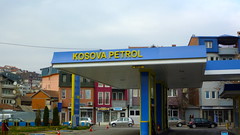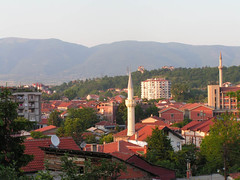There are places where one can travel to in this world where you feel distant and an outsider. Makes sense of course, you are an outsider. But here in Prishtina, time and time again, people who I’ve never met before make me feel like I am their neighbor and they’ve been expecting to see me. Perhaps it is the large number of foreigners who are here working as part of the development and security world. Or maybe it is simply that Kosovars are all over the world and sometimes, they return home for good. Whatever the reason, you’ll rarely meet someone who gets wide eyed if you mention New York or Paris, these cities are part of their vocabulary and in some cases, a familiar part of their lives.
It all makes for a strange and alluring atmosphere; wander into a café and one friend will introduce you to another. Before you know it, a conversation that transcends borders and the conventional small-talk erupts. They will want to meet up again, as often is possible, they will make time for you, don’t worry. No topic seems off the table. Even those probably tired and repetitive visitor questions about the country and its significant list of problems. Its no problem here, we can talk about it, we can even talk about problems in a far away land, no country or context is too distant.
Surely it is an old song. I came to Kosovo and made some fantastic friends that I shall seek to see again and surely never forget . I’ve said that of so many countries I doubt anyone takes it seriously. But this is no polite travel note, this is a seasoned veteran traveller telling it like it is in his experience. The world may often forget about Kosovo these days, but here in Prishtina, Kosovo is very much a part of the great big world.

 Over the last ten years this website and my work has often revolved around those with a compelling story, the under reported actors who seek to somehow change or impact the world. Those individuals are often writers, activists, journalists, NGO workers in forgotten corners of the world, and sometimes public figures. One group of people that is hardly ever mentioned here yet has a tremendous role in our society, are comedians. They perhaps never get mentioned as I myself do not often meet them in person, but rather I admire them from a far. But I recognize their influence nonetheless, and take great meaning from the way they look at and explain the world. A world where it is increasingly hard to be a comedian as subjects and language get labelled as unacceptable, taboo, and even flat-out banned.
Over the last ten years this website and my work has often revolved around those with a compelling story, the under reported actors who seek to somehow change or impact the world. Those individuals are often writers, activists, journalists, NGO workers in forgotten corners of the world, and sometimes public figures. One group of people that is hardly ever mentioned here yet has a tremendous role in our society, are comedians. They perhaps never get mentioned as I myself do not often meet them in person, but rather I admire them from a far. But I recognize their influence nonetheless, and take great meaning from the way they look at and explain the world. A world where it is increasingly hard to be a comedian as subjects and language get labelled as unacceptable, taboo, and even flat-out banned. Contrary to what the media tells us, Black Friday is not about shopping.
Contrary to what the media tells us, Black Friday is not about shopping. 
 The border crossing looks new and partly unfinished. In different corners there are exposed wires and lamp fixtures that will probably soon find their permanent place. It is the middle of the afternoon on a quite holiday afternoon, the border guard in his nice new blue jacket and pants saunters onto the bus looking at each person’s passport. As he approaches a few other western passengers seated in from of me, I notice the nice blue patch on his arm featuring the yellow outline of the country, “Its your first time in Kosovo?” he asks each of us, “Just visiting?”
The border crossing looks new and partly unfinished. In different corners there are exposed wires and lamp fixtures that will probably soon find their permanent place. It is the middle of the afternoon on a quite holiday afternoon, the border guard in his nice new blue jacket and pants saunters onto the bus looking at each person’s passport. As he approaches a few other western passengers seated in from of me, I notice the nice blue patch on his arm featuring the yellow outline of the country, “Its your first time in Kosovo?” he asks each of us, “Just visiting?”